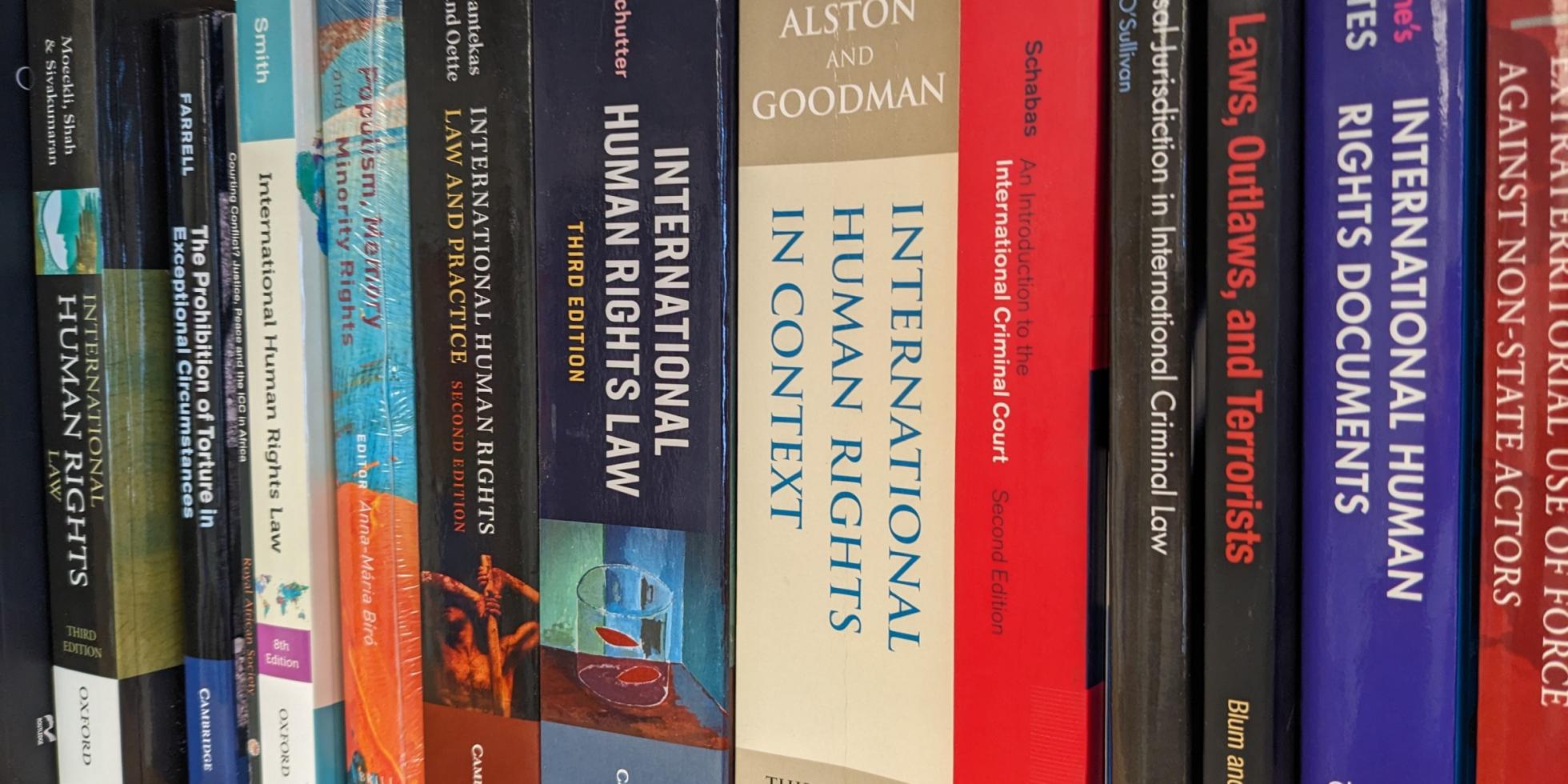The virtual human rights library brings together resources from multiple libraries and information services, both internal and external, to create an online hub dedicated to the study of human rights. This curation is unique in its interdisciplinary concerns and focuses on writings and research from social sciences, humanities, and law.
The virtual library is continually updated with the latest academic research in issue areas, as well as with relevant films, recorded conversations, and other forms of media.
Searchable Database
Click into the dropdowns to select the disciplines, keywords, and media type for your search, and then hit "Apply."
John Hagan, Ron Levi "Justiciability as field effect: When sociology meets human rights." Sociological Forum, pp. 372-380. Blackwell Publishing, 2007.
We focus on a central aspect of Blau and Moncada's argument: that a wider range of human rights violations ought to be regarded as justiciable, legally actionable, and formally criminalized. Although we share their normative goals, the turn to law...
Darren O’Byrne "On the Sociology of Human Rights: Theorising the Language-structure of Rights." Sociology 46, no. 5 (2012): 829-843.
This article defends the claim that human rights is a legitimate subject of inquiry for sociologists, and proceeds to present the case for a particular application of sociological theory to the understanding of gross human rights violations. Sociology, it claims...
Bryan Turner "Outline of a Theory of Human Rights." Sociology 27, no. 3 (1993): 489-512.
Although the study of citizenship has been an important development in contemporary sociology, the nature of rights has been largely ignored. The analysis of human rights presents a problem for sociology, in which cultural relativism and the fact-value distinction have...
Mikael Rask Madsen "Reflexivity and the Construction of the International Object: The Case of Human Rights." International Political Sociology 5, no. 3 (2011): 259-275.
Recent years have seen a surge of interest in applying the sociology of Pierre Bourdieu in international studies as part of a more general sociological turn observable in both international and European studies. However, different from earlier attempts at deploying...
Lydia Morris Rights: Sociological Perspectives (Routledge, 2006)
This pioneering book demonstrates how different traditions of sociological thought can contribute to an understanding of the theory and practice of rights. It provides a sociological treatment of a wide range of substantive issues but never loses sight of the...
Sharyn Roach Anleu "Sociologists confront human rights: the problem of universalism." Journal of Sociology 35, no. 2 (1999): 198-212.
This paper examines sociologists' current interest in the topics of human rights and globalisation. Some descnbe a world where everyone has rights (or at least a modicum of rights), because we are all human, and we all interact and communicate...
Wade Cole "Sovereignty Relinquished? Explaining Commitment to the International Human Rights Covenants, 1966-1999." American Sociological Review 70, no. 3 (2005): 472-495.
This article examines whether the content of the International Human Rights Covenants and the costs associated with their ratification influence the decision of countries to join. The author evaluates three theoretical perspectives-rationalism, world polity institutionalism, and the clash of civilizations-with...
Daniel Levy, Natan Sznaider "Sovereignty transformed: a sociology of human rights " The British Journal of Sociology 57, no. 4 (2006): 657-676.
This paper examines how global interdependencies and the consolidation of a human rights discourse are transforming national sovereignty. Social researchers frequently address the supremacy of state sovereignty and the absoluteness of human rights as mutually exclusive categories. However, rather than...
Christopher Einolf "The Fall and Rise of Torture: A Comparative and Historical Analysis." Sociological Theory 25, no. 2 (2007): 101-121.
Torture was formally abolished by European governments in the 19th century, and the actual practice of torture decreased as well during that period. In the 20th century, however torture became much more common. None of the theories that explain the...
Guilherme Leite Gonçalves, Sérgio Costa "The Global Constitutionalization of Human Rights: Overcoming Contemporary Injustices or Juridifying Old Asymmetries?." Current Sociology 64, no. 2 (2016): 311-331.
Recent decades are marked by an impressive expansion of actors and legal structures intended to globally extend a certain ‘Western’ catalog of human rights. Recently, too, legal scholars have developed concepts to justify normatively the expansion of human rights (e.g...
Please Note:
While the Virtual Library is now live for use, we are still working to update its contents and improve its functionality.
It is usable by all visitors, but the hyperlinks to materials listed are for UChicago community members with a CNet ID and password.
Please direct feedback and suggestions to Kathleen Cavanaugh.
For technical assistance, email pozenhumanrights @ uchicago.edu.

